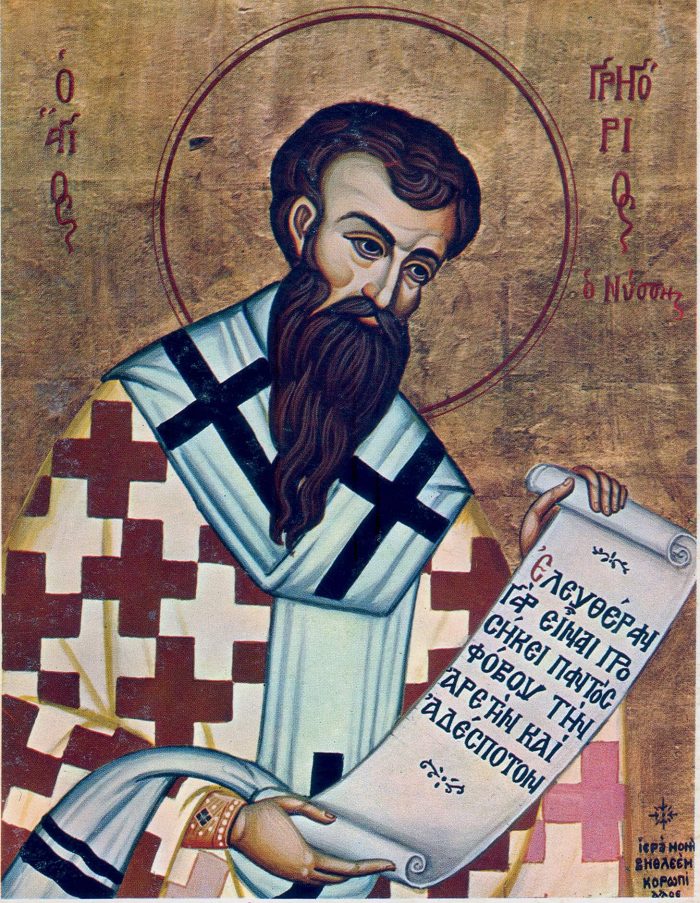Rev. José Mario O. Mandía
jmom.honlam.org
We have studied two of the three Cappadocian Fathers: Saint Basil the Great and Saint Gregory of Nazianzus. Today we turn our attention to the last one: Saint Gregory of Nyssa, who was a brother of Saint Basil.
Gregory did not have the leadership and administrative skills of Basil, nor the poetic talent of the other Gregory, but he surpassed both in speculative theology and mysticism. “His writings reveal a depth and breadth of thought which surpass that of Basil and Gregory of Nazianzus. The reader is struck by his open-mindedness towards contemporary currents of intellectual life, by his great adaptability and the keenness of his thought” (Quasten III, p. 256).
Gregory of Nyssa was born in 335 AD, five years after his brother Basil. “His Christian education was supervised with special care by his brother Basil – whom he called ‘father and teacher’ (Letter 13, 4) – and by his sister Macrina” (Benedict XVI, General Audience, 29 August 2007). He became a teacher of rhetoric and got married. With the influence of his friends, especially Gregory of Nazianzus, he dedicated to live the ascetic life in a monastery founded by his brother Basil.
In 371, Gregory was named bishop of Nyssa, a little town under his brother Basil’s metropolitan district of Caesarea. Basil said that Gregory was not firm enough in dealing with people and was not fit for Church politics and financial matters. “When he was accused of embezzlement by heretical adversaries, he was obliged for a brief period to abandon his episcopal see but later returned to it triumphant (cf. Letter 6) and continued to be involved in the fight to defend the true faith” (Benedict XVI, General Audience, 29 August 2007).
Gregory attended the Council of Constantinople in 381, where Arianism was finally defeated. In 394, he attended a Synod in Constantinople. After 395, nothing more was heard from him.
Gregory helped to defend the doctrine concerning the Blessed Trinity from “heretics who denied the divinity of the Son and of the Holy Spirit (such as Eunomius and the Macedonians) or compromised the perfect humanity of Christ (such as Apollinaris)” (Benedict XVI, General Audience, 29 August 2007).
Under the inspiration and influence of Origen (cf. Church Fathers 15 & 16), Gregory of Nyssa commented on “Sacred Scripture, reflecting on the creation of man. This was one of his central topics: creation. He saw in the creature the reflection of the Creator and found here the way that leads to God” (Benedict XVI, General Audience, 29 August 2007).
He wrote: “The sky was not made in God’s image, not the moon, not the sun, not the beauty of the stars, no other things which appear in creation. Only you (human soul) were made to be the image of nature that surpasses every intellect, likeness of incorruptible beauty, mark of true divinity, vessel of blessed life, image of true light, that when you look upon it you become what he is, because through the reflected ray coming from your purity you imitate he who shines within you. Nothing that exists can measure up to your greatness” (Homilia in Canticum 2).
Sin, however, mars the image of God in man. This is why man needs to be purified. “If, with a diligent and attentive standard of living, you wash away the bad things that have deposited upon your heart, the divine beauty will shine in you…. Contemplating yourself, you will see within you he who is the desire of your heart, and you will be blessed” (De Beatitudinibus 6: PG 44, 1272ab).
Saint Gregory also highlights the active role of man’s freedom in purification. He wrote that “our spiritual birth is the result of a free choice, and we are in a certain way our own parents, creating ourselves as we ourselves wish to be, and through our will forming ourselves in accordance with the model that we choose” (Vita Moysis 2, 3).
He also assures us that we will not be mistaken if we strive to know and follow Christ who is our Model and Teacher of holiness. A Christian must “always examine his own thoughts, his own words and his own actions in his innermost depths to see whether they are oriented to Christ or are drifting away from him” (De perfectione Christiana).
The desire to be like Christ means finding Him in the poor and needy. “Be generous with these brothers and sisters, victims of misfortune. Give to the hungry from what you deprive your own stomach” (De Pauperibus Amandis).


 Follow
Follow


